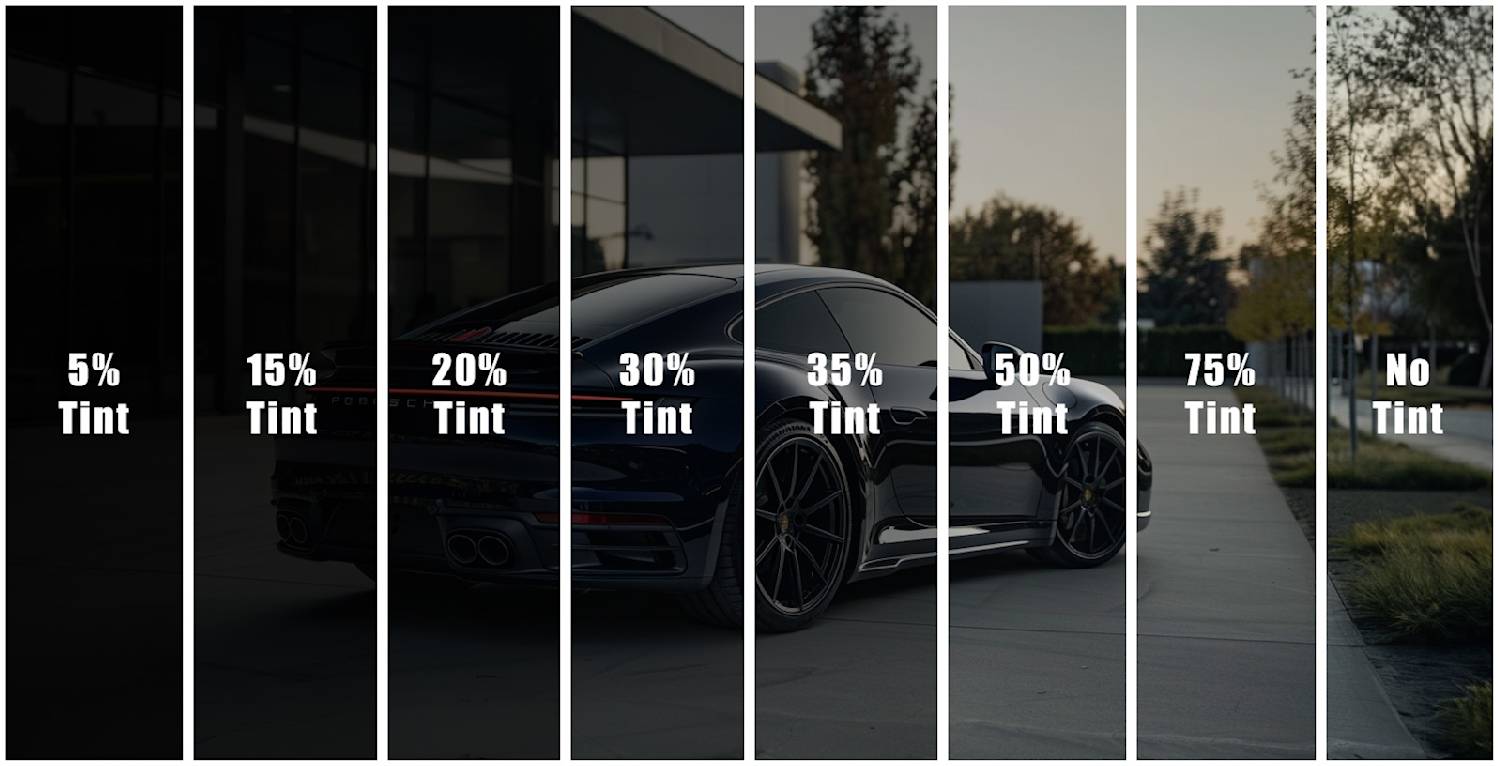How Window Tinting Can Improve Privacy and Reduce Heat in Your Car
How Window Tinting Can Improve Privacy and Reduce Heat in Your Car
Blog Article
Window Tinting Rules: What You Need to Know Before Tinting Your Vehicle
Comprehending home window tinting laws is essential for any lorry proprietor considering tinting their vehicle. Rules vary significantly from state to state, developing particular restrictions for Visible Light Transmission (VLT) portions, specifically for front-side windows and windshields. Failing to conform with these legislations can cause penalties, the requirement to eliminate the color, and difficulties with insurance coverage. As you ponder boosting your vehicle's look and capability, it is essential to comprehend not only the lawful effects however additionally the useful considerations that come with picking the appropriate tint. What aspects should you prioritize in your decision-making process?
Importance of Understanding Tint Laws
Comprehending window tinting legislations is essential for automobile owners to make certain conformity with state laws. These laws dictate the permissible levels of color darkness and reflectivity, which can significantly vary from one territory to one more. Stopping working to follow these guidelines can result in penalties, compulsory elimination of the tint, and possible difficulties during vehicle inspections.
In addition, understanding these regulations helps lorry owners make educated choices concerning their tinting options. Different sorts of window movies provide different advantages, such as UV protection, warmth being rejected, and glare decrease. Without understanding of the legal limitations, automobile owners take the chance of picking products that may inevitably lead to legal problems.
Furthermore, recognition of tinting regulations fosters a safer driving setting. window tinting. Exceedingly dark tints can impair exposure, boosting the threat of mishaps, especially at evening or in negative weather. Regulation enforcement firms also utilize these guidelines to make certain road safety, making compliance not just an individual responsibility however a lawful commitment
State-Specific Tint Rules
Each state in the U.S. has established its own particular regulations pertaining to home window tinting, showing a varied range of needs and criteria. These laws can differ considerably, influencing exactly how car owners approach installment and compliance. Some states enable darker tints on back home windows while imposing strict limitations on front-side windows.
Furthermore, regulations commonly specify allowed color materials and colors. Specific states prohibit reflective colors altogether, while others may permit them to a restricted degree. Furthermore, some jurisdictions mandate that cars with tinted windows display a sticker label showing compliance with state regulations, providing a clear recognition for police.
Enforcement of these regulations likewise varies; some states are extra aggressive, conducting random checks, while others rely upon grievances or noticeable offenses to start enforcement. Lorry proprietors must realize that failure to abide with state-specific tint guidelines can bring about fines, obligatory removal of unlawful colors, or both.

Lawful Tint Percentages
Identifying the lawful color portions is essential for lorry proprietors looking for to abide by state guidelines. Each state has specific laws regulating just how much light has to travel through the windows of a lorry, which is revealed as a percent understood as Noticeable Light Transmission (VLT) This percentage varies dramatically throughout states and can depend on the type of home window-- front side, back side, and windshield.
For example, some states allow as little as 20% VLT on front side home windows, while others might allow as much as 50%. visit homepage Windscreen tinting is commonly more limited, with several territories permitting just a narrow band of color on top of the windscreen. On the other hand, back windows normally have much more tolerant regulations, with some states permitting darker colors.
It is essential for car owners to acquaint themselves with their regional laws to prevent prospective lawful problems. This includes understanding just how VLT is measured, as it can vary based upon the sort of home window movie utilized. Staying informed concerning these laws ensures conformity and promotes secure driving conditions for both the car owner and others when traveling.
Consequences of Non-Compliance
Stopping working to abide by window tinting legislations can result in significant effects for lorry proprietors. The most prompt effect is the potential for web traffic quits and citations from police. Police officers trained to determine unlawful tint degrees might release fines, which can differ by jurisdiction but typically vary from modest to substantial amounts. Repeated infractions may result in enhanced penalties, consisting of greater fines or extra factors on a vehicle copyright.

Insurance provider may likewise penalize for non-compliance, as prohibited adjustments can be deemed a breach of plan terms. If an incident takes place., this might affect insurance coverage rates or lead to issues in cases.
Ultimately, the repercussions of non-compliance expand past instant punitive damages; they can influence a driver's insurance prices, lawful standing, and general automobile worth, highlighting the relevance of sticking to local window tinting laws.
Tips for Deciding On Tinting Options
When picking window tinting choices,Recognizing the ramifications of non-compliance highlights the relevance of making notified options. To start with, familiarize yourself with your state's details laws pertaining to tint darkness and reflectivity. Each state has unique policies that determine the acceptable limits, so ensure you stay within these guidelines to avoid fines.
Second of all, consider the kind of tint product. Alternatives include dyed, metalized, and ceramic tints, each offering varying levels of warmth rejection, UV security, and sturdiness. For example, ceramic colors give premium warm resistance without disrupting digital tools, making them a preferred selection.
Furthermore, examine your main purpose for tinting. If you seek boosted privacy, select darker tints; nevertheless, bear in mind that this might affect visibility in the evening. On the other hand, if glare decrease and UV defense are your primary issues, lighter colors may be sufficient.
Last but not least, speak with a specialist installer who is experienced about neighborhood policies and can suggest premium materials suited to your needs (window tinting). Taking these factors right into account will ensure you make a knowledgeable choice, inevitably improving both your car's aesthetics and functionality
Verdict
In verdict, experience with home window tinting legislations is vital prior to using tint to a vehicle. By comprehending legal demands and picking proper color materials, car proprietors can attain visual enhancement while remaining certified with appropriate legislations.
Understanding window tinting laws is important for any type of car owner taking into consideration tinting their car.Recognizing window tinting regulations is important for car owners to make certain compliance with state guidelines. Some More about the author states allow darker tints on back home windows while imposing stringent restrictions on front-side windows.
In contrast, rear home windows commonly have much more lenient guidelines, with some states allowing darker colors. (window tinting)
In final thought, experience with window tinting regulations is crucial prior to using tint to a car.
Report this page